Rewilding Lincoln’s Wild Home
By Seth Young
President Lincoln’s Cottage and the Armed Forces Retirement Home grounds have always provided habitat for wildlife and a serene natural setting for those on the grounds.
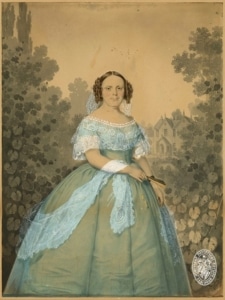
A portrait of George Riggs’s wife, Janet Sheddon Riggs, with the Cottage in the background
Even before the property was purchased by the federal government in 1859, its plants and vistas were enjoyed by the Riggs family. Alice Riggs, daughter of George Riggs who built the Cottage and eventually sold the property to the US Government, recalled enjoying her childhood under a pair of sassafras trees just south of the Cottage. In a letter she once wrote, “When I was a child, my mother’s mother, who lived with us, used to call these trees ‘the twins’, and we had a bench seat between them, which used to be a favorite place for us to sit in the shade, have tea parties and play with our dolls.”
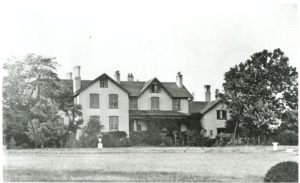
The Cottage as it looked during the Lincoln years
During the 20th century, the areas directly around the Cottage and Visitor Education Center took on a more tidy appearance, reminiscent of the formal gardens of England, dominated by neatly-trimmed boxwood hedges. These landscape beds, while orderly and visually appealing in some ways, provided little benefit to our local ecosystem.
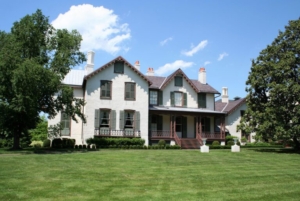
The Cottage with the boxwoods circa 2008, prior to rewilding
Over the past few years staff at President Lincoln’s Cottage have begun incorporating native plants and increasing the diversity in our landscaping. But what’s the point?
Native plants are those that occur in the regions in which they evolved. Their deep roots improve soil and reduce erosion. Since they are adapted to the local conditions, native plants require less watering and fertilization. They provide beautiful blooms from early Spring until Fall. But most importantly– they support insects.
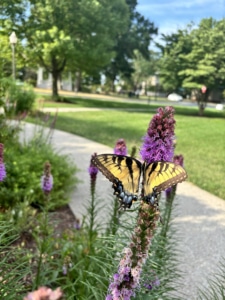
A swallowtail butterfly on a dense blazing star by the R0bert H. Smith Visitor Center
Insects are the foundation of the food web upon which all species depend. Most insects will only eat plants which they co-evolved with over thousands of years (known as ‘host plants’). One famous example of this is the monarch butterfly. Milkweed is the sole host plant for monarchs and their decline is directly attributed to loss of milkweed in North America. Planting milkweed is the best way to help this iconic, imperiled species.
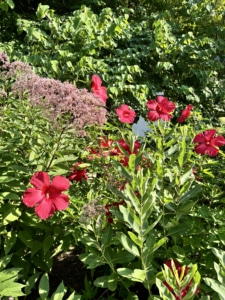
Joe pye weed (left), hardy hibiscus (middle), common milkweed (front)
Another powerhouse plant for pollinators that can be found at President Lincoln’s Cottage is Joe Pye weed (Eutrochium purpureum). This tall, long-blooming plant is a host plant for over three dozen species of moths and caterpillars!
Dense blazing star (Liatris spicata) is another native perennial beloved by hummingbirds, butterflies and other pollinators and its small seeds are attractive to songbirds. It can be found in several locations around the Cottage and Visitor Education Center.
Plan a trip to President Lincolns’ Cottage to see what all the buzz is about! For those interested in learning more about the landscape around the Cottage, be sure to check out our self-guided landscape tour, Lincoln’s Wild Home.
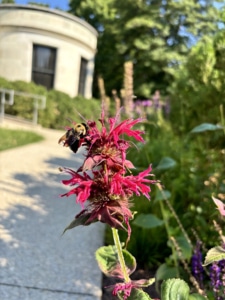
Bumble bee on bee balm by the Visitor Center
Cottage Awards



Wow! We are grateful to everyone who voted for us in our recent ‘Best of’ awards push. In Washington City Paper, we won Best Museum off-the-Mall, and Bourbon and Bluegrass won Best Music Festival! We also won Best Educational Experience from Modern Luxury DC.
Thank you all for your support! You are truly the best of DC!
SOS Students Write Bills to Combat Human Trafficking
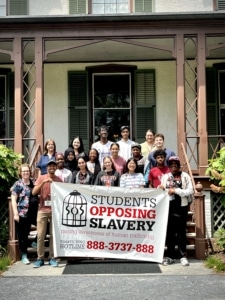
From June 23-28, fifteen students from home and abroad gathered at the annual Students Opposing Slavery International Summit to develop their ideas on combatting human trafficking. These ideas culminated in final projects presented at the end of the week. Two local students who participated (who both happen to be named Vivian) showed their DMV savvy by drafting bills that will assist in the fight for freedom.
Vivian Monaco (16) from Arlington, Virginia proposed a bill to expand and enforce protections for migrants who are issued temporary H-2A visas for agricultural work.
The idea was ignited by a talk by the anti-human-trafficking organization, Polaris, on the first day of the Summit. Listening to this talk, Monaco learned about the prevalence of labor trafficking in urban environments like DC, but also on farms across the United States. Large-scale farming operations often violate or find loopholes with workers’ H-2A visas, resulting in exploitation of migrant workers. “We hear a lot about rights in America – life, liberty, and the pursuit of happiness, it’s shocking to learn that there are a lot of people who don’t have these rights and never will,” said Monaco.
Monaco’s bill establishes fines for violators, ensures oversight over the currently corrupt recruitment process, and makes sure contracts are upheld in the native language of the worker. She will focus on specific districts in California where the levels of H-2A violations are sky-high.
Vivian Yu (18) from Oakton, Virginia plans to introduce a bill to combat a different aspect of human trafficking: preventing a particular circumstance that can increase vulnerability for young Americans in school.
Yu’s bill, the Title IX Training and Education Act, would address the social isolation that often occurs when students are bullied or harassed. Social isolation is, not surprisingly, a strong precursor to trafficking.
Yu’s bill, inspired by her personal struggles with school administration after a harassment situation, mandates that the Department of Education facilitate student advocacy by educating students on their Title IX rights, and training for administrators on how to advocate for their students when these rights are violated. She plans on going to the Capitol with other affected students and approaching different school boards to lobby for the bill.
Other students also presented ideas that were both compelling and practical. Students are working to share information with their own school communities, create websites with resources for survivors and the wider public, developing a podcast to share awareness, and planning advocacy partnerships with Amnesty International, UNICEF, Girl Scouts, and other non-profits.
“These were some of the brightest young change-makers that we have hosted at President Lincoln’s Cottage in the eleven years that we have been convening the Students Opposing Slavery Summit,” said Callie Hawkins, CEO & Executive Director of President Lincoln’s Cottage. “We look forward to seeing them enact their projects and apply the information they learned at the Summit as they move forward with their advocacy work.”
President Lincoln’s Cottage in the News
- The National Trust included the wall painting recently exposed by Director of Preservation Jeff Larry in an article on drawing inspiration from historic wallpaper.
- Petworth News published a Cottage Corner article on the SOS Student bills referenced above.
- Patch.com profiled SOS Student Vivian Monaco and the bill she wrote to combat slavery in agricultural communities.
- Attitude covered Lover of Men, a documentary for which Associate Director of Learning Initiatives Joan Cummins was interviewed.
SUPPORT PRESIDENT LINCOLN’S COTTAGE
Support our educational programs, preservation efforts and public events by making a contribution to President Lincoln’s Cottage. Donate online today.

